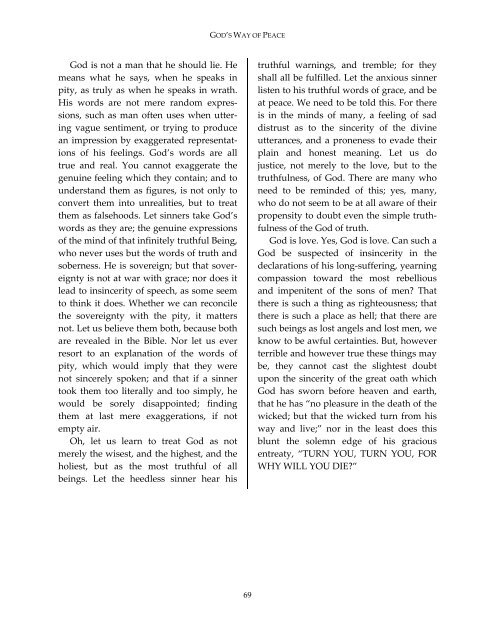God's Way of Peace by Horatius Bonar, D.D.
The seasoned Scottish pastor wrote this short devotional for those suffering from guilt, anxiety, or the consequences of sin. He writes with neither chastisement nor condemnation, but rather immediately directs his readers to Christ’s gift of salvation through his death and resurrection. Bonar reminds all that the Gospel offers hope for the sinner and comfort for the troubled, for God’s perfect, constant grace never fails those who accept it. From Bonar’s time to the present, people have found peace with God afresh through this book. Many people report having read it several times, and turning to it again and again when troubles arise. Kathleen O’Bannon CCEL Staff
The seasoned Scottish pastor wrote this short devotional for those suffering from guilt, anxiety, or the consequences of sin. He writes with neither chastisement nor condemnation, but rather immediately directs his readers to Christ’s gift of salvation through his death and resurrection. Bonar reminds all that the Gospel offers hope for the sinner and comfort for the troubled, for God’s perfect, constant grace never fails those who accept it. From Bonar’s time to the present, people have found peace with God afresh through this book. Many people report having read it several times, and turning to it again and again when troubles arise.
Kathleen O’Bannon
CCEL Staff
Create successful ePaper yourself
Turn your PDF publications into a flip-book with our unique Google optimized e-Paper software.
GOD’S WAY OF PEACE<br />
God is not a man that he should lie. He<br />
means what he says, when he speaks in<br />
pity, as truly as when he speaks in wrath.<br />
His words are not mere random expressions,<br />
such as man <strong>of</strong>ten uses when uttering<br />
vague sentiment, or trying to produce<br />
an impression <strong>by</strong> exaggerated representations<br />
<strong>of</strong> his feelings. God’s words are all<br />
true and real. You cannot exaggerate the<br />
genuine feeling which they contain; and to<br />
understand them as figures, is not only to<br />
convert them into unrealities, but to treat<br />
them as falsehoods. Let sinners take God’s<br />
words as they are; the genuine expressions<br />
<strong>of</strong> the mind <strong>of</strong> that infinitely truthful Being,<br />
who never uses but the words <strong>of</strong> truth and<br />
soberness. He is sovereign; but that sovereignty<br />
is not at war with grace; nor does it<br />
lead to insincerity <strong>of</strong> speech, as some seem<br />
to think it does. Whether we can reconcile<br />
the sovereignty with the pity, it matters<br />
not. Let us believe them both, because both<br />
are revealed in the Bible. Nor let us ever<br />
resort to an explanation <strong>of</strong> the words <strong>of</strong><br />
pity, which would imply that they were<br />
not sincerely spoken; and that if a sinner<br />
took them too literally and too simply, he<br />
would be sorely disappointed; finding<br />
them at last mere exaggerations, if not<br />
empty air.<br />
Oh, let us learn to treat God as not<br />
merely the wisest, and the highest, and the<br />
holiest, but as the most truthful <strong>of</strong> all<br />
beings. Let the heedless sinner hear his<br />
truthful warnings, and tremble; for they<br />
shall all be fulfilled. Let the anxious sinner<br />
listen to his truthful words <strong>of</strong> grace, and be<br />
at peace. We need to be told this. For there<br />
is in the minds <strong>of</strong> many, a feeling <strong>of</strong> sad<br />
distrust as to the sincerity <strong>of</strong> the divine<br />
utterances, and a proneness to evade their<br />
plain and honest meaning. Let us do<br />
justice, not merely to the love, but to the<br />
truthfulness, <strong>of</strong> God. There are many who<br />
need to be reminded <strong>of</strong> this; yes, many,<br />
who do not seem to be at all aware <strong>of</strong> their<br />
propensity to doubt even the simple truthfulness<br />
<strong>of</strong> the God <strong>of</strong> truth.<br />
God is love. Yes, God is love. Can such a<br />
God be suspected <strong>of</strong> insincerity in the<br />
declarations <strong>of</strong> his long‐suffering, yearning<br />
compassion toward the most rebellious<br />
and impenitent <strong>of</strong> the sons <strong>of</strong> men? That<br />
there is such a thing as righteousness; that<br />
there is such a place as hell; that there are<br />
such beings as lost angels and lost men, we<br />
know to be awful certainties. But, however<br />
terrible and however true these things may<br />
be, they cannot cast the slightest doubt<br />
upon the sincerity <strong>of</strong> the great oath which<br />
God has sworn before heaven and earth,<br />
that he has “no pleasure in the death <strong>of</strong> the<br />
wicked; but that the wicked turn from his<br />
way and live;” nor in the least does this<br />
blunt the solemn edge <strong>of</strong> his gracious<br />
entreaty, “TURN YOU, TURN YOU, FOR<br />
WHY WILL YOU DIE?”<br />
69

















